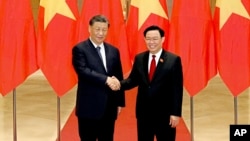A Vietnamese delegation’s visit to China last week has underscored increasingly close economic ties between the territorial rivals, which analysts say is posing a challenge to the dominance of South Korean investment in Vietnam.
Vietnam’s National Assembly Chairman Vuong Dinh Hue led the high-level delegation from April 7 to 12 and met with Chinese President Xi Jinping.
Hue proposed the two countries create a new push for trade development and "connect Vietnam to China's large development strategies."
He also met with the heads of many large Chinese companies that want to participate in Vietnam's infrastructure construction.
China is Vietnam’s largest trade partner and on the way to becoming its biggest foreign direct investor.
A representative of the Korea Chamber of Commerce and Industry, or KCCI, in Vietnam last week told Nikkei Asia that Chinese companies are pushing back South Korean firms as China steps up investment in Vietnam.
"Looking at the cumulative amount of investment in Vietnam since 1988, South Korea ranks first with $85.8 billion, ahead of Singapore and Japan. However, in recent years, Korea has been in a neck-to-neck competition with China," Kim Hyong-mo told the Japan-based Asia news magazine.
More current figures provided by Vietnam’s Ministry of Planning and Investment put South Korean foreign direct investment since 1988 at $87 billion, accounting for more than 18% of the total, followed by Singapore at $76 billion, Japan, Taiwan and Hong Kong.
But in 2023, South Korea ranked fifth after Singapore, Japan, Hong Kong and China, which led in terms of newly registered projects.
According to Joeffrey Maddatu Calimag, an assistant professor at the Department of Global Business Management at Kyungsung University in Busan, South Korea, competition between South Korean and Chinese companies is increasingly fierce.
"South Korean conglomerates like Samsung Electronics Limited have notably ramped up or increased their investment or R&D spending to counter the investments of China's in terms of this sector, the mobile technology,” he told VOA.
“And Chinese companies have demonstrated impressive R&D growth, which can heighten the competition for South Korean firms in Vietnam. These combined with China's technological advancements, presents a formidable challenge to South Korean companies operating in the region," he said.
South Korea’s Samsung is by far the largest single foreign investor in Vietnam.
Vietnam’s Hanoi Times newspaper reports Samsung invested more than $1 billion in Vietnam in 2023, for a total of more than $22 billion, and is expected to invest a further $1 billion per year.
South Korean lens module manufacturer LG Innotek announced last year that it would invest an additional $1 billion in capital in Haiphong City, bringing the company's total investment in Vietnam to more than $2 billion.
But China’s investment is heating up.
Vietnam's Trade Ministry said this month that Chinese automaker Chery signed a joint venture agreement with a Vietnamese company to build a factory in Vietnam at an investment of $800 million, becoming the first Chinese EV manufacturer in Vietnam. China’s BYD, the world’s largest EV maker, also plans to set up a factory in Vietnam.
Reuters reported in November that Chinese solar panel manufacturer Trina Solar, one of five Chinese solar firms the U.S. says used plants in Southeast Asia to avoid duties on panels made in China, plans to nearly double its investment in Vietnam to almost $900 million.
China-based economist and finance commentator He Jiangbing notes that since U.S.-China trade tensions erupted in 2018, many Chinese companies have invested in Southeast Asia to avoid made-in-China tariffs. He says China's domestic overcapacity has also forced Chinese companies to accelerate their overseas deployment.
"The focus of Southeast Asia is Vietnam because [China and Vietnam] are geographically closer. Vietnam also has a large population, with more than 100 million people. It also hoards a large part of the industrial chain transferred from mainland China," He said. "Wherever the industrial chain moves, Chinese companies will follow."
Nguyen Tri Hieu, a Vietnamese American economist, says Vietnam is politically closer to China, a fellow one-party communist state, than democratic South Korea.
"In Vietnam, there is a saying that the relationship between China and Vietnam is just like the teeth and the lips,” he told VOA. “South Korea is politically more remote. I would say [South] Korea is important but is not in the same position as China."
But unlike Hanoi, Seoul has no territorial dispute with Beijing that could threaten to upend the relationship.
China’s and Vietnam’s competing claims to areas in the South China Sea have not halted trade and investment but they have at times slowed it down amid clashes and tensions.
Beijing claims most of the South China Sea as its own, putting it in conflict with Brunei, Indonesia, Malaysia, the Philippines, Taiwan and Vietnam.
Adrianna Zhang contributed to this report.








